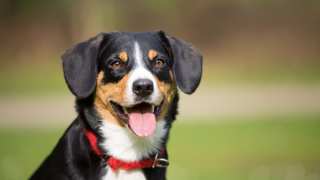The Mini Aussie diet will need to include animal proteins, healthy carbs, vitamins, minerals, and omega fatty acids--nutrients every dog needs to maintain its health in the long term. This means the best food for a Miniature Australian Shepherd is premium dry kibble, as it has balanced portions of the above-listed ingredients. While some owners instead choose to feed their Mini Aussies a "raw" diet if fresh meats, veggies, eggs, and other protein sources, premium dry food is the most popular and sensible choice.
Adult Mini Aussies, depending on their size, age, and activity levels, will need about 2½ cups of premium dry food per day, divided into two meals. Mini Aussie puppy food portions are a bit smaller: again depending on age, about 1¾ cups per day, divided into three meal (not two) until six months of age.
For more info on feeding a Mini Aussie from puppyhood through maturity, see this feeding chart:
Dog AgeDog WeightFood TypeAmountFrequency2 Months6 lbsDry (Puppy formula)0.25 cups3x/day3 Months10 lbsDry0.33 cups3x/day6 Months20 lbsDry0.6 cups3x/day9 Months25 lbsDry* (Puppy/Adult)1 cup2x/day12 Months+30 lbsDry (Adult formula)1.25 cups2x/day*--Around this time, transition to adult food by mixing in adult formula with the puppy formula, in slowly increasing amounts with each meal, for one week.
Try if possible to stick to the above-listed portions. If constantly overfed (and under-exercised), these dogs can become overweight--and a fat Mini Aussie will have numerous health problems and a potentially shortened lifespan. You can help control your Mini Aussie's weight by having consistent feeding and exercise schedules, by not feeding the dog table scraps, and by not leaving food in the dog's bowl all the time.
If you're worried your Mini Aussie is overweight, give the dog this simple test: run a hand along its side, and if you can't feel any ribs, it's diet time--which means less food and more exercise!

